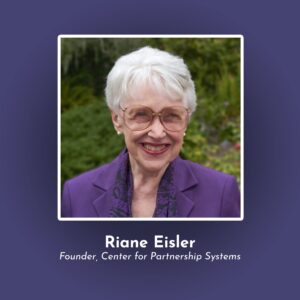
Show Summary
On this episode, Nate is joined by systems scientist Riane Eisler to discuss her decades of work studying ‘domination’ and ‘partnership’ societies throughout history and what it might mean to transition to more sustainable societies in the future. What we value at the individual and family level directly translates to the way we frame our governance systems – societies that emphasize empathy and caring also implement the same types of policies and values. How could we foster the more cooperative side of our humanity across all scales to create empowered communities and balanced decision making? What societies – past and present – lean towards a partnership paradigm and what benefits do their people receive? Is it possible to move away from violence and control oriented systems and into ones that value wide boundaries of empathy and understand the vital nature of care work?
About Riane Eisler
Riane Eisler is the President of the Center for Partnership Systems, which provides practical applications of her work, and Editor in Chief of the online Interdisciplinary Journal of Partnership Studies published at the University of Minnesota. Eisler’s innovative whole-systems research offers new perspectives and practical tools for constructing a less violent, more egalitarian, gender-balanced, and sustainable future. She is author of many books, including The Chalice and the Blade, now in its 57th US printing and 27 foreign editions, The Real Wealth of Nations, and Nurturing Our Humanity co-authored with Douglas P. Fry. For more information, see www.rianeeisler.com and www.centerforpartnership.org.
In French, we have a motto that says that a simple drawing is often better than a long explanation. Jean-Marc Jancovici Carbone 4 President
That’s very understandable because with left atmosphere thinking, one of the problems is that you see everything as a series of problems that must have solutions. Iain McGilchrist Neuroscientist and Philosopher
We can’t have hundreds and hundreds of real relationships that are healthy because that requires time and effort and full attention and awareness of being in real relationship and conversation with the other human. Nate Hagens Director of ISEOF
This is the crux of the whole problem. Individual parts of nature are more valuable than the biocomplexity of nature. Thomas Crowther Founder Restor
Show Notes & Links to Learn More
Download transcript00:00 – Riane Eisler works + Info, www.centerforpartnership.org
02:59 – Systems Theory
03:22 – RAND Corporation, Systems Development Corporation
05:37 – Voyage of the Damned
06:31 – Nurturing our Humanity
07:47 – Impact of the first 5 years on the rest of life, impacts of time in the womb
08:45 – Darwin
08:50 – David Loye
09:48 – Biocultural
09:58 – Taliban, Nazi Germany, Stalin’s Soviet Union, Russian government, Iranian government
11:16 – Nazi Germany gender roles
11:38 – Russian law reducing punishment for family violence in 2017
11:57 – Correlation of strongman family and strongmen state
14:33 – Gender Studies, Child Development
15:08 – The Chalice and the Blade
17:56 – Nature vs Nurture
18:43 – Positive Feedback Loops
19:36 – Empathy and caring in evolution
20:24 – Teduray/Tiruray of the Philippines, studied by Stu A Schlegel
20:50 – Minangkabau and East Sumatra
21:32 – There’s no such thing as a matriarchy
25:06 – America First Party
25:33 – High intelligence children are more empathetic
26:19 – Collective Action
26:58 – Lizards that eat their young
27:22 – Studies of Bonobos vs Chimpanzees
28:28 – Multi-level selection, E.O. Wilson, David Sloan Wilson + TGS Podcast
31:50 – Shia and Sunni
32:40 – Nordic Societies, economy, caring policies
33:27 – The Real Wealth of Nations
36:35 – Gender equity in Nordic Countries, ~45% of Parliaments are female
38:13 – Nordic laws that prohibit physical discipline of children
43:19 – Nordic countries pioneered the first peace studies
45:10 – ACE Studies, prevalence of trauma
46:12 – Origins of capitalism and socialism
46:30 – Mercantilism, Bourgeoisie
48:03 – A wife could not sue for injuries negligently inflicted, only her husband could
50:22 – Nordic countries invest proportionally more foreign aid than any other country
51:44 – Religious stories of Eve, Pandora, Elders of Zion
53:21 – Çatalhöyük, Ian Hodder
54:28 – Self-assessment tool
55:10 – Douglas P. Fry
57:01 – Democrats proposed Paid Family Leave but ultimately compromised
57:28 – Australia study that the care economy would constitute 50% of GDP
59:37 – Gary Barker, TED Talk
1:04:08 – Advances against child labor and other human rights
1:05:40 – Teaching pattern recognition
1:06:03 – Chaos Theory







